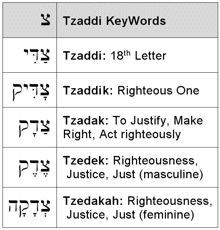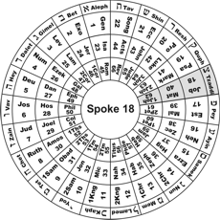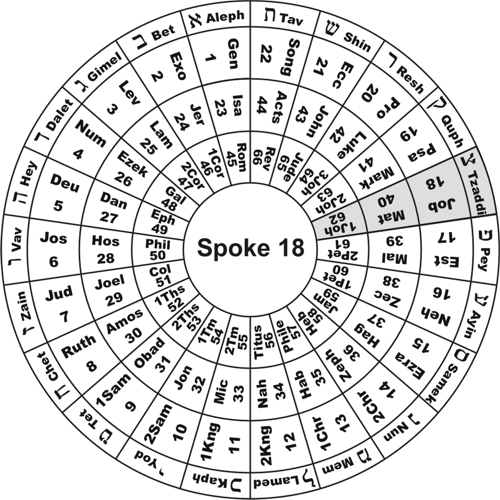The Righteousness of God
My little children, these things write I unto you, that ye sin not.
And if any man sin, we have an advocate with the Father, Jesus Christ the righteous.
1 John 2:1 (Spoke 18, Cycle 3)
God
established the primary symbolic meaning of the Eighteenth Letter with great clarity in six Alphabetic Verses:
- AV Ps 119:137 Righteous (Tzaddik) art thou, O LORD, and upright are thy judgments.
- AV Ps 145:17 The LORD is righteous (tzaddik) in all his ways, and holy in all his works.
- AV Lam 1:18 The LORD is righteous (tzaddik); for I have rebelled against his commandment.
- AV Ps 112:9b ... His righteousness (tzedakah) endureth for ever;
- AV Ps 119:142 Thy righteousness (tzedakah) is an everlasting righteousness.
- AV Ps 119:144 The righteousness (tzedek) of thy testimonies is everlasting:
 God used this KeyWord when He declared the way of the Gospel, "the just (tzaddik) shall live by faith"
(Hab 2:4), and again in the genesis of the Gospel when Abraham "believed in the Lord, and it was counted unto
him as righteousness (tzedakah)" (Gen 15:6, BW book pg 130).
The link between righteousness and the eighteenth letter is ancient and fundamental. Rabbinic tradition uniformly
attests to this understanding of Tzaddi, and to this day many Jews refer to the eighteenth letter by the name Tzaddik. God used this KeyWord when He declared the way of the Gospel, "the just (tzaddik) shall live by faith"
(Hab 2:4), and again in the genesis of the Gospel when Abraham "believed in the Lord, and it was counted unto
him as righteousness (tzedakah)" (Gen 15:6, BW book pg 130).
The link between righteousness and the eighteenth letter is ancient and fundamental. Rabbinic tradition uniformly
attests to this understanding of Tzaddi, and to this day many Jews refer to the eighteenth letter by the name Tzaddik.
All six of the Alphabetic Verses listed above refer to God's perfect and eternal righteousness. He alone is,
was, and ever will be Tzaddik. This is the uniform declaration of all Scripture. But how then do
we understand evil in the world? Why do the righteous suffer? Where is the Divine Counsel concerning the
Problem of Evil in light of God's Righteousness? This is the topic of the Book of Job,
the first of the Five Wisdom Books.
|



